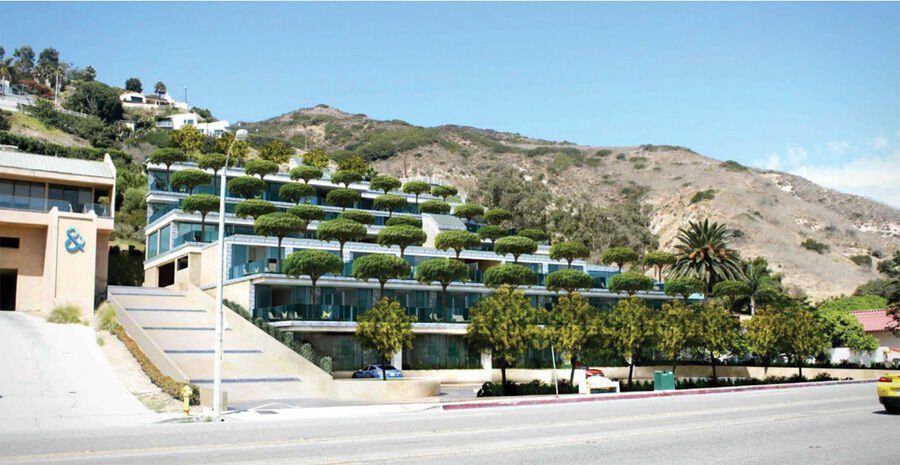
One of eastern Malibu’s most recognizable eyesores is set to become a new, 39-room hotel complete with a pool and spa, large ocean-view deck, and restaurant, after city council voted, 4-1, to approve permits for the project this week.
The project was a rare success for a developer in Malibu, where any building—especially one measuring up at more than 25,000 square feet—can expect to face heavy criticism. But this was no ordinary project. The hotel is designed to replace a run-down former gas station at 22729 Pacific Coast Highway and remodel an existing four-story office building next door at 22741 Pacific Coast Highway.
The project had one other notable difference from other developments—it came with a pledge for a new, 20-inch check valve to be installed “that would increase water flows in the existing water main during emergency events.”
“I’m generally opposed to big developments, but this is taking an existing building and repurposing it and it’s going to add a lot of money to the city … and it’s going to increase our water supply from Topanga,” resident Scott Dittrich said.
Dittrich said he was “worried that we’re going to blow this project,” citing a limitation on temporary use permits, or TUPs, that council was considering imposing on the property.
Developer Norm Haynie, who has been working on the project since at least 2016, said at the meeting he too was concerned strict limits on gatherings and other stipulations may make it impossible to sell the project to a hotel operator. Other nearby event spaces including Malibu Beach Inn and the Malibu Jewish Center & Synagogue are not subject to a limitation on TUPs, city staff reported.
“I think you killed the project,” Haynie said in response to the TUP limitation.
“I don’t see that, Norm,” Council Member Mikke Pierson said. “I see we’re just trying to understand the project and get it done.”
The hotel’s permits will allow up to six TUPs for large events each year; outside those six, “a TUP is not required so long as the attendance on the property does not exceed the number of guests at the hotel, up to 90, and the restaurant capacity of the restaurant is closed to the public.”
Another point of contention was parking; it was decided that “all vehicles other than vehicles owned by hotel employees must be valet parked.” The project comes with a total of 79 parking spaces.
After nearly five hours of staff reports, public comment and discussion, Mayor Paul Grisanti and council members Pierson, Karen Farrer and Steve Uhring voted to approve the project; Mayor Pro Tem Bruce Silverstein was the sole dissenting vote.
“We were limited in our time to discuss this and I had a lot of other issues we didn’t get to,” Silverstein said.
Uhring asked if any of his questions were “show-stoppers,” to which Silverstein replied, “it would have depended on the answers.”
“But, it’s fine. It passed, 4-1,” Silverstein added.
Other council actions
Council voted unanimously, 5-0, to approve an amendment to the city’s no-camping ordinance that would ban camping on property that is “within any area that the city manager, public safety manager or city council may determine from time-to-time to constitute an extreme fire danger … within 200 feet of a residence, and within 1,500 feet of a day care center or public or private school or college within the city limits of Malibu.”
The ordinance also identifies areas where camping is prohibited, such as “any city-owned public park, public beach or public street or public right-of-way, any undeveloped private property on which camping is prohibited, and on any land designated by the fire chief or the city manager as a fire risk area.” However, those locations will not be “criminalized with respect to individuals who do not have access to adequate temporary shelter based solely upon the fact that they are sitting, lying, or sleeping on public property.”
Uhring called the ordinance a “labor of love.”
The ordinance will next appear on a council agenda to be finalized on Sept. 27.
Council voted unanimously, 5-0, to approve purchase and installation of nine automatic license plate readers for use by the LA County Sheriff’s Department, at the cost of $26,000.
“We want the city to own the data, and that way we control who has access to it; this is not being handed over to the sheriff’s department,” Public Safety Commissioner Doug Stewart told council. However, when Silverstein asked what city administrator would be tasked with overseeing the data, there was no clear answer from staff—it was surmised the role would fall to Public Safety Manager Susan Dueñas.
City staff asked LASD Lt. Jim Braden to elaborate on how cameras in other communities are being used.
“The sheriff’s department and deputies have access to everybody’s information; however, there’s strict laws that go along with that,” Braden described.


